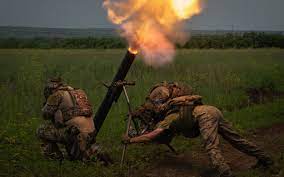Hamish De Bretton-Gordon
After 18 months of the illegal invasion of Ukraine, the war in recent weeks has come to Moscow: first with Ukraine’s protracted drone strikes on the Russian capital, now with one of its warships sinking in its home port in the Black Sea. Though these are small in comparison to the thousands of attacks on civilian and military targets in Ukraine by Russia, they are making some in the West nervous. In tandem to criticisms that Kyiv should be more grateful for the support they are getting, this is a precarious moment: any potential fracturing of the effort to kick the Russians out of Ukraine would be a gift to Vladimir Putin.
It has indeed been a troubled few weeks for the Ukrainian government. The counter-offensive, though still making steady progress every day, has not yet broken through the tough Russian defences. Kyiv has been a victim of its own success: the West expected similar scenes to those we saw last year with vast swathe of territory liberated. Then this week Zelensky had to intervene to de-escalate a diplomatic row with Poland, Ukraine’s close partner. Kyiv had requested a meeting with Warsaw’s representative following comments from a senior Polish figure implying that Ukraine ought to acknowledge the significant assistance it has obtained from Poland since the commencement of Russia’s extensive encroachment the previous year.
Whether this admonishment was signed off by Zelensky or not, by summoning the ambassador, Kyiv is playing with fire. As frustrated as they may be – and it is understandable given the delays of Western weapons deliveries – they are in danger of isolating their allies. Poland and Britain are the two European countries who have been most steadfast in their support of the country. Yet they are also the two who have been most admonished diplomatically recently, with the popular Ukrainian ambassador to the UK who sided with Ben Wallace unceremoniously sacked. It should really be the Germans or the French who are admonished. After all, they have as much to lose if Putin prevails, yet their commitment to an outright Ukrainian victory has been much shakier. I also believe Western anxieties about the drone strikes on Moscow are excessive – not only because of their tiny scale compared to what Ukraine has to endure, but also because of their potential military implications. As we saw with the Wagner mutiny, Russia is hardly stable: such attacks could continue to destabilise the regime. These strikes bring the war to the elite, those rich and entitled few who hitherto have been unaffected by the war, still visiting their super-yachts in the Mediterranean and villas in St Tropez. It is not their children who are dying needlessly in their thousands in the Donbas, but it is them who could persuade Putin to end his disastrous “special military operation”. The other strategic impact is that the Kremlin is said to be moving critical air defence and special forces units from the frontline back to protect the rich and powerful in Moscow. Putin appears more concerned to protect his friends than Russia’s young men at the front. It’s ironic that the former would throw him under the bus and the latter could save him.
Sitting in plush offices and homes in the West, it may seem that President Zelensky is demanding more kit everyday without a thank you or nod to the efforts made by Nato. But as somebody who has spent the last 35 years on the battlefields of the globe, my sympathies are with Kyiv. I was the Peshmerga’s advisor in the fight with ISIS for a few years, and it was their “boots on the ground” which were ultimately responsible for defeating this terror regime who had attacked us, alongside Al Qaeda. Sure, western military hardware and intelligence was important, but it was the Peshmerga’s hard yards on the ground which were decisive. In a similar fashion, and not by design, it is the Ukraine military who have bled the Russian army to a point that it will not be able to threaten Nato conventionally again for a decade or more. Hence, as the Peshmerga silenced ISIS, Ukraine is doing the same to Russia, for which we should be eternally grateful. A weakened Russia is good for the world. Nevertheless, one of Kyiv’s greatest assets has been its ability to masterfully rally countries to its cause. Recently, the perception is they have dropped the ball, feeding its enemies who claim they are ungrateful and escalatory.
Whilst I acknowledge that “manners maketh man”, and a bit of humble recognition can go a long way, let’s face it: sometimes niceties and good manners go out of the window when somebody is trying to blow your head off. The key on the battlefield is to maintain the moral high ground, which Putin and his gangsters have so clearly lost. Missing the odd thank you in the heat of battle is a misdemeanour not a crime. Every Ukrainian I know is eternally grateful for every bit of support they are getting – tanks, medical kits, advice – and I for one hope that the perceived lack of gratitude does not put anybody off from giving Ukraine everything it needs to prevail.







